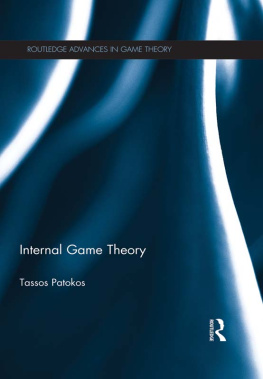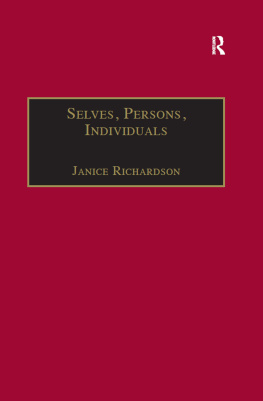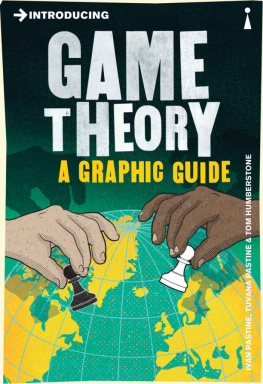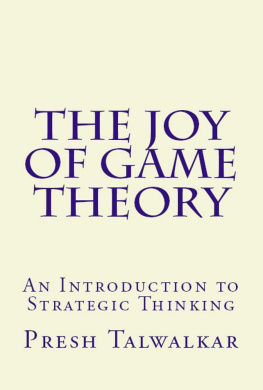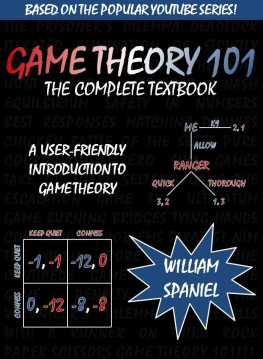Internal Game Theory
Traditional game theory requires at least two individuals. This book extends game theory to the inner workings of a single person.
Using game theory to analyse single individuals makes sense if one thinks of individuals as consisting of two or more relatively autonomous partitions that might have conflicting motives. This is not to say that individuals are literally made up from multiple selves; it only suffices that we adopt a portrayal of the individual as a multilayered entity or of a dual nature, in a manner similar to Adam Smith's depiction of an impartial spectator existing within the individual.
The notion that individuals may be considered as collections of distinct partitions or sub-selves has been challenging writers from diverse fields for many centuries. This book breaks new ground in combining psychological with evolutionary game theory, making for a highly promising way towards a better understanding of the individual and the development of their behaviour, along with the individual's own perceptions on it.
Tassos Patokos is Senior Lecturer in the Department of Accounting, Finance and Economics at the University of Hertfordshire.
Routledge Advances in Game Theory
Edited by Christian Schmidt
1 Game Theory and Economic Analysis
A quiet revolution in economics
Christian Schmidt
2 Negotiation Games
Applying game theory to bargaining and arbitration
Steven J. Brams
3 The Topology of the 2 2 Games
A new periodic table
David Robinson and David Goforth
4 Reciprocity, Altruism and the Civil Society
In praise of heterogeneity
Luigino Bruni
5 Internal Game Theory
Tassos Patokos
Internal Game Theory
Tassos Patokos

First published 2013 by Routledge
2 Park Square, Milton Park, Abingdon, Oxon OX14 4RN
Simultaneously published in the USA and Canada
by Routledge
711 Third Avenue, New York, NY 10017
Routledge is an imprint of the Taylor & Francis Group, an informa business
2013 Patokos Tassos
The right of Tassos Patokos to be identifi ed as author of this work has been asserted by him in accordance with the Copyright, Designs and Patent Act 1988.
All rights reserved. No part of this book may be reprinted or reproduced or utilised in any form or by any electronic, mechanical, or other means, now known or hereafter invented, including photocopying and recording, or in any information storage or retrieval system, without permission in writing from the publishers.
Trademark notice: Product or corporate names may be trademarks or registered trademarks, and are used only for identifi cation and explanation without intent to infringe.
British Library Cataloguing in Publication Data
A catalogue record for this book is available from the British Library
Library of Congress Cataloging in Publication Data
Patokos, Tassos
Internal game theory / Tassos Patokos.
p. cm.
I. Game theory-Psychological aspects. 2. Internalization. I. Title.
HB144.P38 2012
153.8'3015193-dc23
2012040047
ISBN: 978-0-415-60810-7 (hbk)
ISBN: 978-0-203-54722-9 (ebk)
Typeset in Times New Roman
by Refi neCatch Limited, Bungay, Suffolk
Contents
For economists, a substantial moral psychology is an unnecessary distraction from the scientific study of rational choice. Vilfredo Pareto, arguably mainstream economics' forefather, foreshadowed this attitude succinctly: The theory of economic science requires the rigour of rational mechanics; it deduces its results from experience without bringing in any metaphysical entity.
From Pareto's time onwards, mainstream economics has endeavoured to achieve the rigour of rational mechanics by bleaching its models of all psychology, philosophy, sociology; indeed of any motivation that cannot be captured fully in the form of well-defined utility functions whose maximisation yields determinate predictions of Jack's and Jill's behaviour. That the resulting models depict Jill and Jack as simple automata who like what they do and do as they please (given their exogenous constraints and predictive beliefs) causes economists not an iota of philosophical concern. The psychological shallowness of homo economicus is, to them, a source of pride; evidence of the no-nonsense method of their approach.
There are two reasons for questioning the economists' approach. The first is empirical. Study upon study, conducted in laboratory settings, show that the model of homo economicus fails quite miserably to predict how humans act. Furthermore, both introspection and casual empiricism reveal that any theory of consumer choices, of investment decisions, of the practices and actions of those involved in high finance, are replete with psychological processes well beyond the analytical capabilities of homo economicus. The second reason is ontological. Put simply, by reducing all passions to a generalised tendency toward some univariate utility, economists fall into the ontological antinomy of presuming that the ghosts of pain and pleasure can, somehow, plug the void created by thinking of utility as the psychological consequence of actions which utility is also assumed, in some mysterious manner, to motivate.
Tassos Patokos' Internal Game Theory is one of the rare instances when an economist decides to go against the grain of his profession and cast a critical gaze upon the model of agency buried inside every economic model that underpins each and every policy that affects our lives; from competition policy to reform of the financial and labour markets. The author begins with the observation that mainstream economics is, by its own admission, as good as its micro-foundations. And as the games individuals play are the cornerstone of these micro-foundations, game theory and the theory of individual agency is the obvious focus of his study.
Patokos concedes that the economists' emphasis on the strategic interaction between self-interested (not to be confused with selfish) persons is apt. But then he takes this emphasis further by questioning the economists' assumption of an indivisible, mathematically well-defined self whose motives are given and determining at every point in time (even if imperfectly known to others). Instead, Patokos delves further into the self where he discovers a great deal of strategic interaction going on within its confines. In a sense, Patokos opens up the black box of the self, as psychologists have been doing for decades, so as to subject its contents to a game theoretic analysis of the games that go on within the human agent.
One can understand the fear that many have, including economists, of the dark, often dreadful, forces that may surface if we look too intently inside the shadowy confines of our selves; a place where the light of mathematical logic never shines. I can, indeed, understand one's reluctance to delight indiscriminately in this unveiling. However, Patokos' theoretical enterprise is not about such a nonrational celebration of the games within. Rather, he is painstakingly trying to shed, to the extent humanly feasible, rational light on what goes on in the internal republic that produces our motives, preferences and desires. In the chapters that follow, the reader is in for a treat as game theory is applied to the innermost parts of the self where intra-personal doubt and uncertainty are part and parcel of the process that determines both what we do and our

